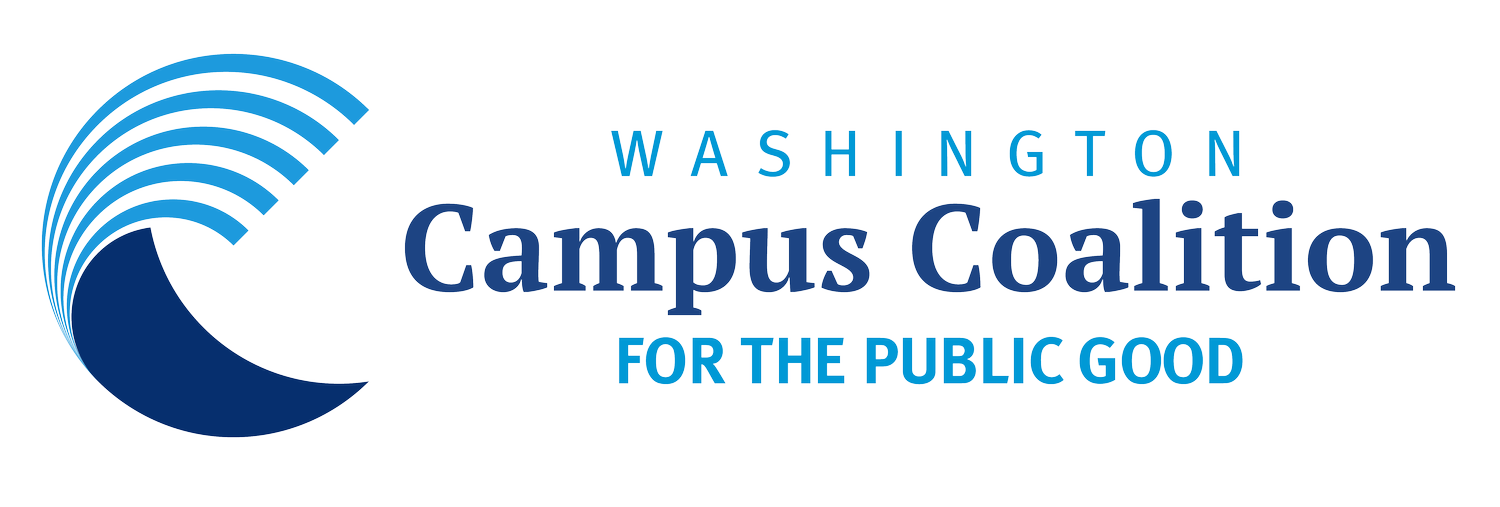Frequently Asked Questions
Please see below for frequently asked questions (FAQs) about our CLEC AmeriCorps program.
Program Overview
-
AmeriCorps
AmeriCorps is a federal agency for national service and volunteerism that provides opportunities for Americans of all backgrounds to serve their country, address the nation’s most pressing challenges, and improve lives and communities.
WACC
WACC (short for Washington Campus Coalition for the Public Good) is a community of higher education institutions committed to advancing the public purpose of colleges and universities, educating students for the workforce and civic leadership, and working in partnership to cultivate vital and sustainable communities.
Note that WACC is a grantee of AmeriCorps and not the agency itself.
CLEC
CLEC (short for Civic Leadership & Engagement Corps) is an AmeriCorps program through WACC that fosters student leadership, campus-community partnerships, civic and community engagement, and knowledge networks focused on improving the retention and success of underrepresented students, increasing awareness and support for equity and inclusion, and building sustainable campus/community partnerships and resilient communities.
For more information, check out the Programs and Institutions infographic.
-
Supervisor
Your supervisor oversees your CLEC AmeriCorps project and day-to-day service activities.
They will orient you to your campus or organization, project, and any community partners.
They also approve your timesheets, progress reports, member evaluation, and any leave requests.
WACC Staff
Our role is to provide grant oversite, oversee member enrollment, and provide CLEC orientations, training & support.
We also monitor sites for compliance, coordinate or host professional development opportunities, and oversee all policies and procedures.
We are also here to troubleshoot issues with Canvas or America Learns, answer policy and procedures questions, or any questions about AmeriCorps or the CLEC program.
For more information, check out our Supervisor and WACC Staff Roles infographic.
-
Yes, there are activities that AmeriCorps members are not allowed to participate in. These are known as prohibited activities.
Since AmeriCorps is an independent federal agency, members may not engage in any partisan political activities during their service terms.
Here’s a quick list of the prohibited activities:
Influencing legislation
Boycotts/Protests/Petitions
Union organizing
Partisan political activities
Religious activities
Benefiting for profit entities
Provide abortion services or referrals
Voter registration drives/census
For a more in-depth look at the prohibited activities, please see page 13 of the Member Service Agreement.
-
No, that doesn’t mean you can’t participate in these activities at all.
Members are allowed to participate in prohibited activities on their own time (“afterhours,” so to speak) but may not identify themselves as an AmeriCorps member or wear the logo while doing so.
-
Yes, this is known as teleservice. Teleservice is serving remotely from a computer at home, not serving virtually from your site.
However, your supervisor is the one who decides if you can do teleservice or not. Please discuss with your supervisor to see if teleservice is allowed during your term.
For more information, please view the Teleservice Policy.
America Learns
-
America Learns is the timekeeping system we use for our members to track their hours.
This is also where we have members perform data tracking and complete progress reports.
-
Yes, even if a member is already recording their hours through a different system with their host site, we still require them to record hours using America Learns.
Segal AmeriCorps Education Award
-
The Segal AmeriCorps Education Award is one of the key benefits that CLEC AmeriCorps members are eligible to receive after they complete their service term and are enrolled in the National Service Trust (also known as the Trust).
The award is not a cash award and cannot be cashed out.
-
The award amount for a full-time member is equal to the maximum value of a Pell Grant.
Here's a break-down of the award amounts for CLEC AmeriCorps positions enrolled between 8/1/2023 and 7/31/2024 after successful service term completion:
Stipend Members
1700 hours: $6,895.00
900 hours: $3,447.50
Student Fellows
450 hours: $1,824.07
300 hours: $1,459.26
For more information about the award amount, visit this AmeriCorps page.
-
The education award can only be used at Title IV schools. Check the list of Title IV schools here. Members can also use the award to pay for current educational expenses and repay qualified loans.
Eligible Education Expenses
Title IV courses
Including many universities, colleges, trade schools, outdoor education programs, schools overseas, and international programs
Cost of attendance not covered by other financial aid (determined by your financial aid office at the school)
Qualified Student Loans
Loans backed by the federal government under Title IV of the Higher Education Act (except PLUS Loans to parents of students)
Examples include: Stafford Loans, Perkins Loans, Wm. D. Ford Federal Direct Loans, Federal Consolidated Loans, Supplement Loans to Students, & Guaranteed Student Loans
Loans under Titles VII or VIII of the Public Service Health Act
Examples include: HEAL, HPSL, Nursing Student Loans, Primary Care Loans, & Loans for Disadvantaged Students
Loans made by a state agency, including state institutions of higher education
For more ideas, visit the Purpose Confluence and watch this video by America Learns and Do Good, Be Good called How I Used My Education Award.
-
CLEC AmeriCorps members may also be eligible for loan forbearance on qualified student loans based on their national service. Forbearance puts a pause on loan payments.
After the member has successfully completed their service term and earned an education award, the Trust will pay all or a portion of the interest accrued during the member’s service but only on loans placed in forbearance during the member’s service term.
Interest payments are not subtracted from the education award amount but are made in addition to education award payments. The portion of the accrued interest that the Trust pays is determined by the type (full or part-time) and length of the member’s service term.
-
Upon successful service completion, members can expect the education award to be deposited into their My AmeriCorps account a few weeks (in rare cases longer) after exiting and must access and use this award within seven years.
The award is not a cash award and cannot be cashed out.
-
All payments made using the Segal AmeriCorps Education Award are subject to federal tax in the year each payment is made. It is considered taxable income regardless of whether it is used to pay current educational costs or to repay qualified student loans.
Payments made for interest accrued during the term of service are also subject to income taxes in the year the payment is made. Interest payments are made on your behalf for the interest that accrued during your service term. These payments are made in addition to your education award and are not subtracted from your award balance.
AmeriCorps does not withhold taxes from the award. By the end of January each year, AmeriCorps sends a 1099 MISC Form to all AmeriCorps members for whom payments have been made totaling $600.00 or more during the previous year. These include both payments from education awards and payments of interest that accrued while the person was serving. The 1099 MISC Form reflects the total amount that AmeriCorps reports as taxable miscellaneous income to the IRS.
-
Use My AmeriCorps to:
Check your award balance and value
Request payments to educational institution and loan holder
Request forbearance on qualified student loans
Update contact information
Check living allowance and tax statements
For any other questions about how to access and use the Segal AmeriCorps Education Award, please contact the National Service Hotline at 1-800-942-2677.
Professional Development
-
Professional development is any reflection, elective classes, symposiums, workshops, or presentations that will support the member’s service to their community .
This includes but is not limited to:
Earning a certificate (e.g. CPR, first aid, forklift operator) as long as it is not for college credit
Researching and applying for jobs or graduate school and working on application materials including resumes and cover letters
Expanding the member’s network and developing networking skills while working with local non-profits and/or government agencies
Development, implementation, and/or involvement with peer training
Professional conference workshops and presentations
New language acquisition to better serve the community
NOTE: Classes taken as part of an academic program do not count as professional development.
-
Members may only count a maximum of 20% of their service hours as professional development.
Max professional development hours for each of our service terms:
Stipend Members
1700 hours: 340 hours max
900 hours: 180 hours max
Student Fellows
450 hours: 90 hours max
300 hours: 60 hours max
NOTE: Members who go over the maximum amount of professional development hours must serve extra direct service hours to make up the difference.
-
No, professional development hours are optional but highly encouraged for members to participate in.
National Days of Service
-
National Days of Service present AmeriCorps programs and host sites with a special opportunity to address unmet community needs, collaborate with other AmeriCorps programs, build AmeriCorps member morale and teamwork, promote volunteerism and service in local communities, and highlight the difference AmeriCorps members make across the nation.
-
Martin Luther King, Jr. Day of Service - Third Monday in January
Random Acts of Kindness Day - February 17
AmeriCorps Week - Second Full Week of March
Cesar Chavez Day - March 31
National Volunteer Week - Third Full Week of April
Earth Day - April 22
9/11 Remembrance Day - September 11
Make a Difference Day - Fourth Saturday in October
Family Volunteer Day - Third Thursday in November
Giving Tuesday - Tuesday after Thanksgiving
-
National Days of Service are optional but highly encouraged for members to participate in.
Stipend members who participate will be asked to report their participation in mid-term and end-of-term evaluations. Student fellows only need to report participation in end-of-term evaluations.

